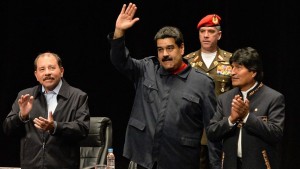Carlos Sánchez Berzaín
October 9, 2018
 (Interamerican Institue for Democracy) Cuba, Venezuela, Nicaragua, and Bolivia are under regimes that after applying all possible simulations and misrepresentation in order to appear to be a revolution, a democracy, populist, leftist, and socialist governments are nothing but Organized Crime’s organizations that hold power by force. There have been denouncements, proposals, warnings, and bilateral and multilateral sanctions imposed to help the people to regain freedom and democracy, but these have only been useful to show the stubbornness of dictators who appear to point out that the only other option for them to leave the government is the use of force.
(Interamerican Institue for Democracy) Cuba, Venezuela, Nicaragua, and Bolivia are under regimes that after applying all possible simulations and misrepresentation in order to appear to be a revolution, a democracy, populist, leftist, and socialist governments are nothing but Organized Crime’s organizations that hold power by force. There have been denouncements, proposals, warnings, and bilateral and multilateral sanctions imposed to help the people to regain freedom and democracy, but these have only been useful to show the stubbornness of dictators who appear to point out that the only other option for them to leave the government is the use of force.
International Law, transformed since the creation of the United Nations Organization (UN), has evolved making every time more relative, or less absolute, the concept of “sovereignty” of the States. Sovereignty, understood as “the supreme power that belongs to an independent State” has progressively yielded competencies to the international arena on the basis of common principles, values, and needs, such as international security and peacekeeping, Human Rights, sanctions against crimes against humanity, the fight against Transnational Organized Crime, democracy, the governments’ responsibility to protect, and many other achievements aimed at curbing the practices of those governments who under the allegation of sovereignty oppress, massacre their people and threaten other States.
Besides making the concept of sovereignty as something relative, the UN while establishing the principle of “prohibition to the use of threats or force” acknowledges there are three exceptions that are “the collective actions to keep or reestablish international peace and security through the Security Council, the “legitimate defense” as a natural right, and the “humanitarian intervention”.
In this legal context the principle of non-intervention of the Estrada Doctrine of 1930, along with its regional scope, and the self-determination of the nations, are not valid legal arguments because they have been overcome by the creation of new institutions. Besides, alleging self-determination of the nations in order to oppress them and to violate their human rights is but another flaw of the Castroist Chavist dictatorships.
Guidelines are not lacking for the international community, one or several democratic governments, to act against organized crime’s dictatorships. There are enough facts and jurisprudence regarding the humanitarian crisis in Venezuela, or the one rapidly turning as the bloodiest crisis in Nicaragua, or the oldest and most lethal in Cuba, or the one most interlinked in Bolivia. Neither is there a lack of causal factors for the people to exercise their supreme right of rebellion against tyranny and oppression as guaranteed in the Universal Declaration of Human Rights.
Dictatorships from Cuba, Venezuela, Nicaragua, and Bolivia are one and the same undertaking, organized as a single subject of international law. Their allegiance with Russia and China to block Security Council resolutions is amply evident with the temporary presidency of Bolivia to manipulate and hinder its agenda. Their allegiance with other dictatorships, such as North Korea is evident. Their ties with regimes who promote Islamic terrorism can no longer be hidden. Support to other governments, such as that of Spain’s PSOE, orchestrated by the PODEMOS party, is saddening but nevertheless real.
What started out as the Bolivarian Movement, 21st Century Socialism, and today is simply known as Castroist Chavist dictatorships, is about a group that has left politics behind and has replaced it by the exercise of organized crime that destabilizes democracy and security throughout the Americas. A group that wrongly shelters itself under the guidelines of International Law that it uses as an alibi, but cannot be applied to them because of their criminal nature. They practice open and aggressive meddling in the politics and societies of other States who they threaten, overtly or covertly, and have turned Venezuela, Cuba, Nicaragua, and Bolivia into narco-states and have openly stated at the UN that “the fight against narcotics’ trafficking is an instrument of Imperialism to oppress the people” making out of this crime a weapon against the region and the world.
Americas’ democracies, nations, peoples, and governments have been placed into a critical situation, one in which the region’s dictatorships –as the de-facto regimes they are- have given notice they will not leave the government but by force.
*Attorney & Political Scientist. Director of the Interamerican Institute for Democracy.
Published in Spanish by Infobae.com . Sunday, October 7, 2018
 Carlos Sanchez Berzain Abogado | Estadista | Político | Politólogo
Carlos Sanchez Berzain Abogado | Estadista | Político | Politólogo